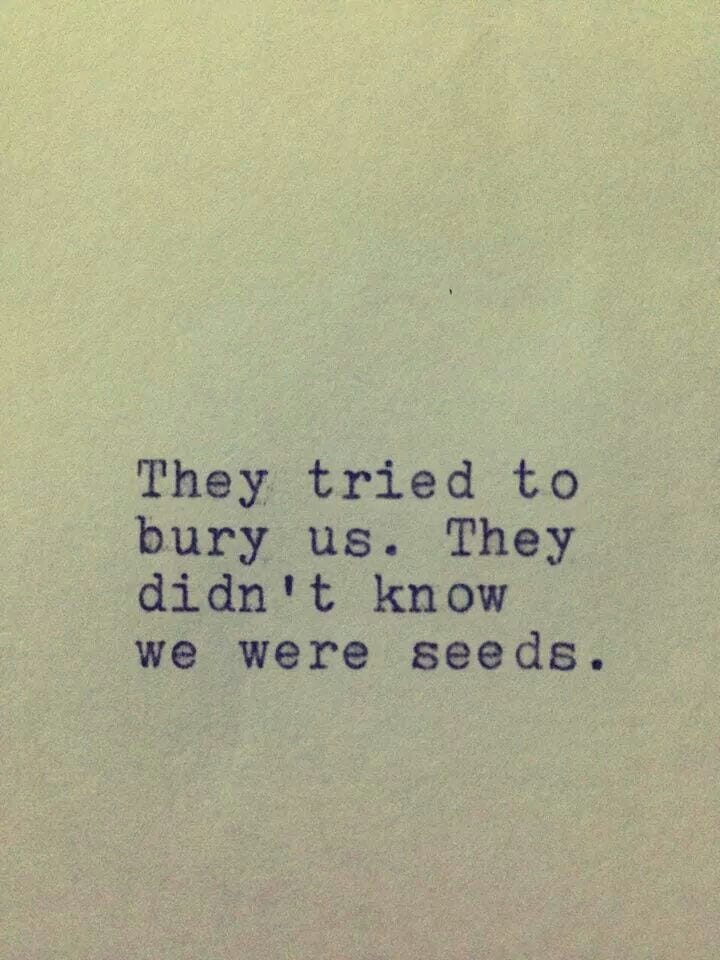It’s spring; Earth Day and Easter are next week. It seems like everyone is talking about planting and blooming. Or at least living in the dirt until you bloom.
The seed metaphor keeps coming up for me because 1) it mirrors our experience of the earth in the northern hemisphere right now and 2) it mirrors my experience of feeling buried right now.
Liz Cooledge Jenkins reflects on the theme: It’s a dark time, but seeds sprout in darkness (and we are seeds). Jenkins writes:
“Why speak of vegetable seeds in a time of crisis like the one we’re living in?
“For one thing, I think gardening is one of those things that can ground us and hold us together when there are many reasons to fall apart. So many reasons. …
“It’s remarkable where life can take root and thrive. These times we’re living in are no exception.
“Who knows what we, like seeds, might grow into in this season? Who knows who we might become? What new courage, action, wit, compassion, and goodness the challenges of this time might call forth in us? What art we will create, what relationships we will build, what resistance we will embody, who we will help in a time of need, who will help us?”
Then, the opening line from this post from Andrea Gibson has stuck with me and will definitely make it into my Easter sermon:
“I love imagining the pep talks butterflies give to depressed caterpillars…”
Sometimes I feel like a butterfly. But really more than anything right now I feel a cross between a buried seed and a disheartened caterpillar.
So what are the butterflies speaking to me right now?
I’m reading a book that takes place in 1920s/30s Russia. The main character is under house arrest in a hotel in Moscow. Outside of his direct experience there are occasional references to characters being arrested in back alleys and taken away to work camps without any due process and many aren’t heard from again. This isn’t hyperbole; it’s history. And it feels so affirming to read about this time in history: that people probably felt powerless then, too; that the powerful did whatever they could get away with and kept going; and that some people still embraced small things to love about life in the midst of societal upheaval and state-sponsored violence.
Also, a line in Alexander McCall Smith’s What W.H. Auden Can Do for You makes me feel seen.
McCall Smith first came across Auden when he was in Northern Ireland in 1973-74 during The Troubles. He reflects on how your setting and circumstances affect the way you find meaning in an author’s words.
“In such an air of crisis, Auden’s thirties poetry seemed utterly apt, with its sense of things about to go wrong, of unreason about to be unleashed.”1
Poetry makes so much sense in times of crisis, as in times of pain or grief. I’m spending more time with W.H. Auden right now – a butterfly who’s lived through a lot speaking to the caterpillar.
Auden’s poem - September 1, 1939 – was photocopied and circulated around New York City in the days after 9/11. I read it again in April 2025 and find new depth and meaning.
“I sit in one of the dives
On Fifty-second Street
Uncertain and afraid
As the clever hopes expire
Of a low dishonest decade:
Waves of anger and fear
Circulate over the bright
And darkened lands of the earth,
Obsessing our private lives;
The unmentionable odour of death
Offends the September night.“Accurate scholarship can
Unearth the whole offence
From Luther until now
That has driven a culture mad,
Find what occurred at Linz,
What huge imago made
A psychopathic god:
I and the public know
What all schoolchildren learn,
Those to whom evil is done
Do evil in return. …“All I have is a voice
To undo the folded lie,
The romantic lie in the brain
Of the sensual man-in-the-street
And the lie of Authority
Whose buildings grope the sky:
There is no such thing as the State
And no one exists alone;
Hunger allows no choice
To the citizen or the police;
We must love one another or die.“Defenceless under the night
Our world in stupor lies;
Yet, dotted everywhere,
Ironic points of light
Flash out wherever the Just
Exchange their messages:
May I, composed like them
Of Eros and of dust,
Beleaguered by the same
Negation and despair,
Show an affirming flame.”
Thank you for reading Almost Named Grace. Writers really value readers who share their work by forwarding, sharing on an online platform, and yes, by word of mouth. I wouldn’t be here without you, so thank you!
I love hearing from readers… replies to this email will be sent directly to me. Keep in touch!
A Gentleman in Moscow by Amor Towles
What W.H. Auden Can Do for You by Alexander McCall Smith
Thank you for reading Almost Named Grace! Subscribe for free to receive new posts right in your inbox. Paid subscribers also receive weekly sermon notes whenever I preach.
Smith, A. M. (2022). What W. H. Auden can do for you. Princeton University Press, p. 31.






This feels like a spirit synchronicity, Frances. I was writing about seeds this week too! Thank you for your beautiful reflection!